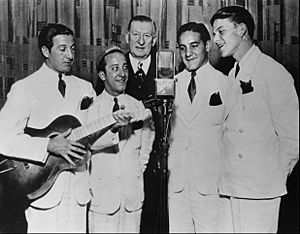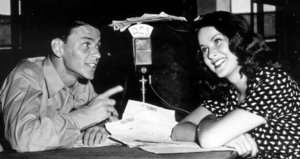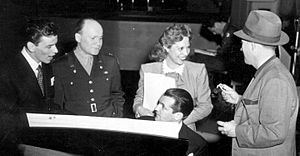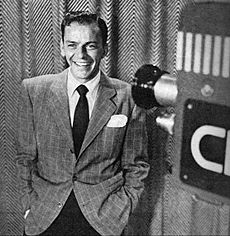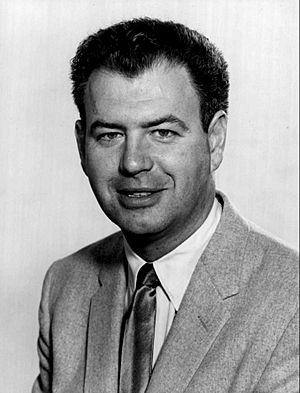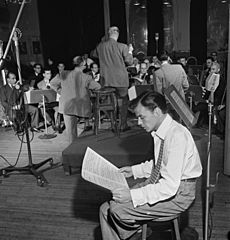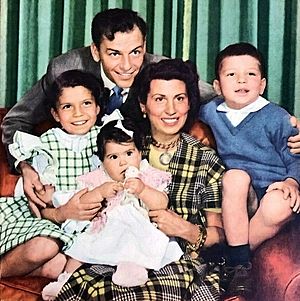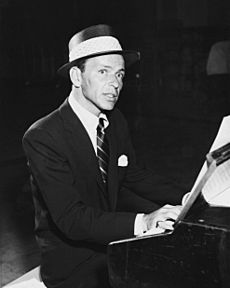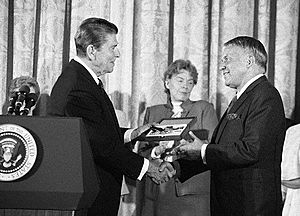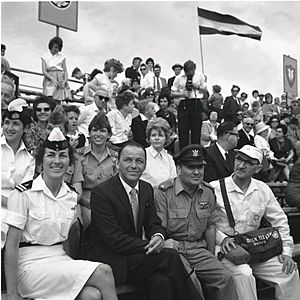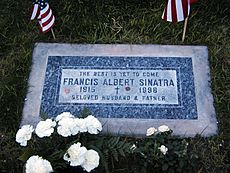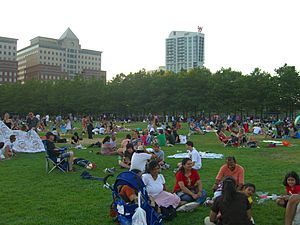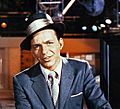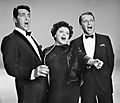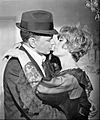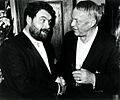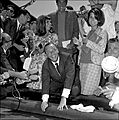Frank Sinatra facts for kids
Quick facts for kids
Frank Sinatra
|
|
|---|---|
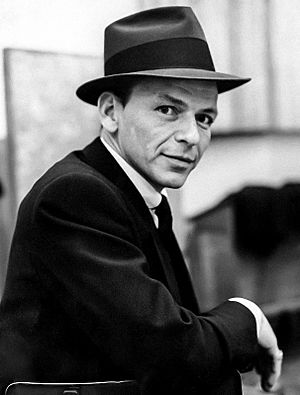
Sinatra, c. 1957
|
|
| Born |
Francis Albert Sinatra
December 12, 1915 Hoboken, New Jersey, U.S.
|
| Died | May 14, 1998 (aged 82) Los Angeles, California, U.S.
|
| Burial place | Desert Memorial Park |
| Occupation |
|
| Years active | 1935–1995 |
| Spouse(s) |
Nancy Barbato
(m. 1939; div. 1951) |
| Children | |
| Parent(s) |
|
| Musical career | |
| Genres | |
| Instruments | Vocals |
| Labels | |
Frank Sinatra (born Francis Albert Sinatra; December 12, 1915 – May 14, 1998) was a famous American singer and actor. He was one of the most popular entertainers from the 1940s to the 1960s. He sold an amazing 150 million records, making him one of the world's top-selling music artists.
Sinatra won many awards, including eleven Grammy Awards. These included special honors like the Grammy Trustees Award, Grammy Legend Award, and the Grammy Lifetime Achievement Award.
Contents
- Frank Sinatra's Early Life
- Education and First Jobs
- Frank Sinatra's Music Career
- Frank Sinatra's Artistry
- Frank Sinatra's Film Career
- Frank Sinatra's Family Life
- Style and Personality
- Politics and Activism
- Frank Sinatra's Death and Funeral
- Frank Sinatra's Legacy and Honors
- Frank Sinatra in Film and Television
- Interesting Facts About Frank Sinatra
- Frank Sinatra Quotes
- Discography
- Images for kids
- See also
Frank Sinatra's Early Life
Frank Sinatra was born on December 12, 1915, in Hoboken, New Jersey. He was the only child of Italian immigrants. His mother was Natalina "Dolly" Garaventa, and his father was Antonino Martino "Marty" Sinatra.
Frank's mother, Dolly, worked as a midwife, helping deliver babies. She also knew many languages and helped people in her town as an interpreter. His father, Marty, was a boxer and later worked for 24 years at the Hoboken Fire Department. He became a captain there.
Frank spent a lot of time at his parents' local gathering place in Hoboken. He would do his homework there and sometimes sing a song for spare change. During the Great Depression, his mother gave him money for friends and nice clothes. Because of this, neighbors called him the "best-dressed kid in the neighborhood."
From a young age, Frank loved music, especially big band jazz. He listened to singers like Gene Austin and Bing Crosby, who he admired a lot.
Education and First Jobs
Sinatra went to David E. Rue Jr. High School starting in 1928. In 1931, he attended A. J. Demarest High School (now Hoboken High School). He helped organize bands for school dances. However, he left school after only 47 days and did not graduate. He was asked to leave for being too noisy.
To make his mother happy, he enrolled in Drake Business School. But he left after 11 months. Dolly then found him a job delivering newspapers for the Jersey Observer. After that, he worked at a shipyard. He started singing for free in local clubs and on radio stations like WAAT in Jersey City.
Frank Sinatra's Music Career
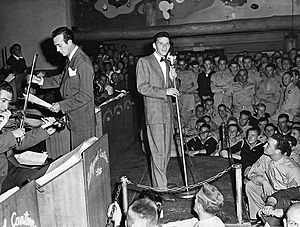
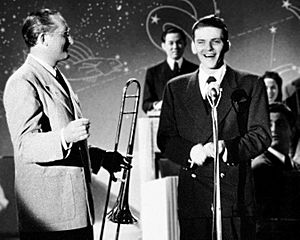
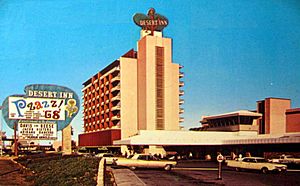
Frank Sinatra started his music career during the swing era. He sang with famous bandleaders like Harry James and Tommy Dorsey. People started calling him "Swoonatra" or "The Voice." His fans were known as "Sinatratics."
He became a solo star after signing with Columbia Records in 1943. He became a huge idol for young fans, especially teenage girls called "bobby soxers." They would write his song titles on their clothes. Some even tried to bribe hotel maids to touch his bed!
Sinatra released his first album, The Voice of Frank Sinatra, in 1946. In the early 1950s, he moved to Las Vegas. He became one of the most famous performers there and was part of the well-known Rat Pack. By 1946, he was performing up to 45 times a week. He sang as many as 100 songs daily and earned a lot of money.
Sinatra later signed with Capitol Records. He released many popular albums, including In the Wee Small Hours (1955) and Songs for Swingin' Lovers! (1956). Other hits were Come Fly with Me (1958) and Only the Lonely (1958).
In 1960, Sinatra left Capitol to start his own record label, Reprise Records. He released many more successful albums. In 1965, he recorded September of My Years. He also starred in the TV special Frank Sinatra: A Man and His Music, which won an Emmy Award.
After Sinatra at the Sands with Count Basie in 1966, he worked with Tom Jobim on Francis Albert Sinatra & Antonio Carlos Jobim. He also recorded Francis A. & Edward K. with Duke Ellington in 1968. Sinatra retired for the first time in 1971 but came back two years later. He recorded more albums and performed at Caesars Palace. In 1980, he released the famous song "New York, New York." He continued to tour until shortly before he passed away in 1998.
Frank Sinatra's Artistry
Sinatra often swam and held his breath underwater. He did this to improve his breathing for singing. He wanted everything to be perfect. If his voice didn't feel right, he would stop a recording session. He would then reschedule it for the next day, but still pay his musicians.
Unlike many other singers, Sinatra spent weeks thinking about which songs to record. He also chose a specific music arranger for each song. During his career, he made over 1000 recordings. Before each three-hour recording session, he would spend an hour practicing his voice. He would also rehearse with the orchestra to make sure the sound was just right.
Frank Sinatra's Film Career
Sinatra wanted to be an actor in Hollywood in the early 1940s. Even though he liked movies, he wasn't always confident about his acting. He once said that "pictures stink." His first film role was a small, uncredited part in Las Vegas Nights (1941). He sang "I'll Never Smile Again" with Tommy Dorsey's Pied Pipers.
He also had a small role in Reveille with Beverly (1943), singing "Night and Day." Then, he got bigger roles in Higher and Higher and Step Lively (both 1944).
Metro-Goldwyn-Mayer cast Sinatra with Gene Kelly in the musical Anchors Aweigh (1945). He played a sailor on leave in Hollywood. This movie was a big success. The song "I Fall in Love Too Easily", sung by Sinatra, was nominated for an Academy Award. He also appeared in Till the Clouds Roll By (1946), singing "Ol' Man River."
His acting career really took off with the 1953 film From Here to Eternity. For this movie, Sinatra won an Academy Award and a Golden Globe Award for Best Supporting Actor.
Sinatra also starred in The Man with the Golden Arm (1955) and The Manchurian Candidate (1962). He appeared in musicals like On the Town (1949), Guys and Dolls (1955), and High Society (1956). His role in Pal Joey (1957) earned him another Golden Globe. Later in his career, he often played detectives, like in Tony Rome (1967).
In 1971, Sinatra received the Golden Globe Cecil B. DeMille Award. On television, The Frank Sinatra Show started on CBS in 1950. He continued to appear on TV throughout the 1950s and 1960s.
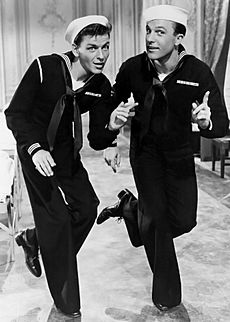
Frank Sinatra's Family Life
Frank Sinatra had three children with his first wife, Nancy Sinatra (born Barbato). Their children were Nancy (born 1940), Frank Jr. (1944–2016), and Tina (born 1948). He was married to Nancy from 1939 to 1951.
Sinatra was married to Hollywood actress Ava Gardner from 1951 to 1957. They announced their separation in 1953, but their divorce wasn't final until 1957. Sinatra always cared deeply for her, and they remained friends for life.
He later married Mia Farrow on July 19, 1966. This marriage was short, ending in divorce in 1968. They also remained close friends.
Sinatra's last marriage was to Barbara Marx. They married on July 11, 1976, and stayed together until his death. Their wedding was at Sunnylands in Rancho Mirage, California.
Style and Personality
Sinatra was known for his perfect sense of style. He spent a lot of money on expensive, custom-made tuxedos and stylish suits. He felt that dressing well made him feel important and showed respect to his audience. He was also very particular about cleanliness. When he was with the Tommy Dorsey band, he was nicknamed "Lady Macbeth" because he showered often and changed his outfits a lot. His beautiful deep blue eyes earned him the nickname "Ol' Blue Eyes."
Politics and Activism
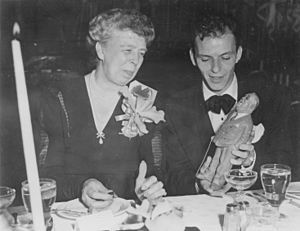
Frank Sinatra's political views changed over his life. He was closest to President John F. Kennedy. Sinatra often invited Kennedy to Hollywood and Las Vegas.
He supported Hubert Humphrey in 1968 and was a strong supporter of the Democratic Party until the early 1970s. Even though he was still a registered Democrat, Sinatra supported Republican Ronald Reagan for governor of California in 1970. He officially changed his political support in 1972 when he backed Richard Nixon for president.
In the 1980 presidential election, Sinatra supported Ronald Reagan and gave a lot of money to his campaign. Sinatra organized Reagan's Presidential gala, just as he had done for Kennedy years before. In 1985, Reagan gave Sinatra the Presidential Medal of Freedom. Reagan said that Sinatra's "love of country" and "generosity" made him a remarkable American.
From a young age, Sinatra cared deeply about African Americans. He worked both publicly and privately to help them gain equal rights. He believed that parents taught children prejudice. Sinatra played a big part in ending segregation in Nevada hotels and casinos in the 1950s and 1960s.
Frank Sinatra's Death and Funeral
Frank Sinatra passed away at Cedars-Sinai Medical Center in Los Angeles on May 14, 1998. He was 82 years old. His wife was with him when he died after suffering two heart attacks. Sinatra had been unwell for several years. He had heart and breathing problems, high blood pressure, pneumonia, and bladder cancer. He also had symptoms similar to dementia.
The night after he died, the lights on the Empire State Building in New York City turned blue. The lights on the Las Vegas Strip were dimmed in his honor, and casinos stopped spinning for one minute.
Sinatra's funeral was held on May 20, 1998, in Beverly Hills, California. About 400 people attended, and thousands of fans gathered outside. His close friends Jilly Rizzo and Jimmy Van Heusen are buried nearby. Sinatra's original grave marker had the words "The Best Is Yet to Come" and "Beloved Husband & Father." Later, the grave was changed to read "Sleep Warm Poppa." After his death, his record sales increased greatly around the world.
Frank Sinatra's Legacy and Honors
Music critic Robert Christgau called Sinatra "the greatest singer of the 20th century." His popularity is similar to that of Bing Crosby, Elvis Presley, The Beatles, and Michael Jackson.
In his hometown of Hoboken, Sinatra received the Key to the City in 1947. In 2003, the city's main post office was named in his honor. A bronze plaque marks the spot where he was born. The Hoboken Historical Museum has items from his life and offers walking tours about him. Frank Sinatra Drive runs along the Hudson River Waterfront Walkway. Frank Sinatra Park on the waterfront has a bronze plaque placed in 1989. In 2021, a 6-foot (1.8 m) tall bronze statue of Sinatra was placed in the park on his birthday, December 12.
A building at Montclair State University in New Jersey is named after him. Other buildings include the Frank Sinatra School of the Arts in New York and the Frank Sinatra International Student Center in Jerusalem. The Frank Sinatra Hall at the USC School of Cinematic Arts in Los Angeles was dedicated in 2002. A restaurant dedicated to Sinatra opened at the Wynn Resorts' Encore Las Vegas in 2008.
Several streets in the U.S. are named after Frank Sinatra. These include Frank Sinatra Drive in Cathedral City and Palm Desert in California. There's also a Frank Sinatra Drive near the Las Vegas Strip.
The United States Postal Service released a postage stamp in Sinatra's honor in May 2008. This marked ten years since his death. The United States Congress also made May 13 "Frank Sinatra Day" to celebrate his contributions to American culture.
Sinatra received three special honorary degrees. In 1976, he received an Honorary Doctorate from the University of Nevada, Las Vegas (UNLV). He said this was the first degree he had ever held. He also received honorary doctorates from Loyola Marymount University in 1984 and the Stevens Institute of Technology in 1985.
Frank Sinatra in Film and Television
Sinatra's life has been shown many times in movies and on TV. A TV miniseries called Sinatra aired on CBS in 1992. It was directed by James Steven Sadwith, who won an Emmy Award. Philip Casnoff played Sinatra in the series, which was produced by Sinatra's daughter, Tina.
Other actors who have played Sinatra include Ray Liotta in The Rat Pack (1998) and James Russo in Stealing Sinatra (2003). Dennis Hopper played him in The Night We Called It a Day (2003). Robert Knepper played him in My Way (2012). Comedians Joe Piscopo and Phil Hartman also made fun of him on Saturday Night Live.
A movie about Sinatra directed by Martin Scorsese has been planned for a long time. A BBC documentary series called Arena focused on Sinatra in 1998. Alex Gibney directed a four-part series about him for HBO in 2015. A musical tribute was shown on CBS in December 2015 for his 100th birthday. In 2018, Rico Simonini played Sinatra in the film Frank & Ava. In 2020, it was announced that singer Scott Stapp would play Frank Sinatra in the movie Reagan.
Interesting Facts About Frank Sinatra
- Sinatra never learned how to read music.
- When he was born, doctors had to use special tools, which left scars on his face, neck, and ear. It also damaged his eardrum, which stayed that way his whole life.
- Early in his career, Sinatra sometimes sang for food or cigarettes.
- To speak better, he took lessons from a vocal coach named John Quinlan. Quinlan was one of the first to notice Sinatra's amazing singing voice.
- In his free time, Sinatra enjoyed listening to classical music and going to concerts.
- He swam in the Pacific Ocean every day. He found it relaxing and a good way to be alone.
- He often played golf and enjoyed painting, reading, and building model trains.
- Throughout his career, Sinatra recorded over 1,300 songs and appeared in more than fifty films.
- May 13 is known as "Frank Sinatra Day."
- President Ronald Reagan gave Sinatra the Presidential Medal of Freedom in 1985.
- He did not serve in the military during World War II because of his damaged eardrum.
- Sinatra believed that the character Johnny Fontane in the novel The Godfather was based on him.
- He has three stars on the Hollywood Walk of Fame for his work in film and music.
- In 1995, for Sinatra's 80th birthday, the Empire State Building glowed blue.
- Many items from Sinatra's life, like his awards and gold records, are displayed at USC's Frank Sinatra Hall in Los Angeles. They are also at the Wynn Resort's Sinatra restaurant in Las Vegas.
Frank Sinatra Quotes
- "Don’t hide your scars. They make you who you are."
- "You only live once, and the way I live, once is enough."
- "If you possess something but you can't give it away, then you don't possess it... it possesses you."
- "When I sing, I believe. I'm honest. If you want to get an audience with you, there's only one way. You have to reach out to them with total honesty and humility."
- "Fear is the enemy of logic. There is no more debilitating, crushing, self-defeating, sickening thing in the world--to an individual or to a nation."
Discography
- The Voice of Frank Sinatra (1946)
- Songs by Sinatra (1947)
- Christmas Songs by Sinatra (1948)
- Frankly Sentimental (1949)
- Dedicated to You (1950)
- Sing and Dance with Frank Sinatra (1950)
- Songs for Young Lovers (1954)
- Swing Easy! (1954)
- In the Wee Small Hours (1955)
- Songs for Swingin' Lovers! (1956)
- Close to You (1957)
- A Swingin' Affair! (1957)
- Where Are You? (1957)
- A Jolly Christmas from Frank Sinatra (1957)
- Come Fly with Me (1958)
- Frank Sinatra Sings for Only the Lonely (1958)
- Come Dance with Me! (1959)
- No One Cares (1959)
- Nice 'n' Easy (1960)
- Sinatra's Swingin' Session!!! (1961)
- Ring-a-Ding-Ding! (1961)
- Come Swing with Me! (1961)
- Swing Along With Me (1961)
- I Remember Tommy (1961)
- Sinatra and Strings (1962)
- Point of No Return (1962)
- Sinatra and Swingin' Brass (1962)
- All Alone (1962)
- Sinatra Sings Great Songs from Great Britain (1962)
- Sinatra–Basie: An Historic Musical First with Count Basie (1962)
- The Concert Sinatra (1963)
- Sinatra's Sinatra (1963)
- Sinatra Sings Days of Wine and Roses, Moon River, and Other Academy Award Winners (1964)
- America, I Hear You Singing with Bing Crosby and Fred Waring (1964)
- It Might as Well Be Swing with Count Basie (1964)
- 12 Songs of Christmas with Bing Crosby and Fred Waring (1964)
- Softly, as I Leave You (1964)
- September of My Years (1965)
- Sentimental Journey (1965)
- My Kind of Broadway (1965)
- A Man and His Music (1965)
- Moonlight Sinatra (1966)
- Strangers in the Night (1966)
- That's Life (1966)
- Francis Albert Sinatra & Antonio Carlos Jobim with Antonio Carlos Jobim (1967)
- The World We Knew (1967)
- Francis A. & Edward K. with Duke Ellington (1968)
- The Sinatra Family Wish You a Merry Christmas with Frank Sinatra Jr., Nancy Sinatra and Tina Sinatra (1968)
- Cycles (1968)
- My Way (1969)
- A Man Alone (1969)
- Watertown (1970)
- Sinatra & Company with Antonio Carlos Jobim (1971)
- Ol' Blue Eyes Is Back (1973)
- Some Nice Things I've Missed (1974)
- Trilogy: Past Present Future (1980)
- She Shot Me Down (1981)
- L.A. Is My Lady (1984)
- Duets (1993)
- Duets II (1994)
Images for kids
-
Sinatra with Dean Martin and Judy Garland in 1962
-
Sinatra with Jill St. John in Tony Rome (1967)
-
Caesars Palace in 1970, where Sinatra performed from 1967 to 1970 and 1973 onwards
-
Sinatra with President Richard Nixon and Italian Prime Minister Giulio Andreotti in 1973
-
Brendan Grace and Sinatra in 1991
-
Sinatra with Grace Kelly on the set of High Society (1956)
See also
 In Spanish: Frank Sinatra para niños
In Spanish: Frank Sinatra para niños
- Frank Sinatra bibliography
- Frank Sinatra's recorded legacy
- The Frank Sinatra Show (radio program)


